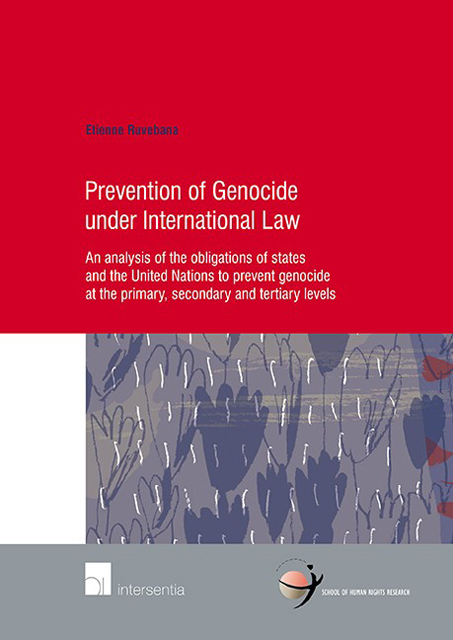 Prevention of Genocide Under International Law
Prevention of Genocide Under International Law Book contents
- Frontmatter
- Acknowledgements
- Contents
- List of Abbreviations
- Chapter I General Introduction
- Chapter II The Concept of Prevention as Understood in various Fields
- Chapter III The Concept of Prevention in the Field of Genocide in General
- Chapter IV Prevention of Genocide Under International Law
- Chapter V The Obligation of Territorial States to Prevent Genocide Under International Law
- Chapter VI Prevention of Genocide by Non-Territorial States Under International Law
- Chapter VII The United Nations and the Obligation to Prevent Genocide Under International Law
- Chapter VIII Prevention of Genocide and the Concept of the Responsibility to Protect
- Chapter IX Summary and General Conclusions
- Bibliography
- Samenvatting
- Curriculum Vitae
- School of Human Rights Research Series
Chapter III - The Concept of Prevention in the Field of Genocide in General
Published online by Cambridge University Press: 24 November 2022
- Frontmatter
- Acknowledgements
- Contents
- List of Abbreviations
- Chapter I General Introduction
- Chapter II The Concept of Prevention as Understood in various Fields
- Chapter III The Concept of Prevention in the Field of Genocide in General
- Chapter IV Prevention of Genocide Under International Law
- Chapter V The Obligation of Territorial States to Prevent Genocide Under International Law
- Chapter VI Prevention of Genocide by Non-Territorial States Under International Law
- Chapter VII The United Nations and the Obligation to Prevent Genocide Under International Law
- Chapter VIII Prevention of Genocide and the Concept of the Responsibility to Protect
- Chapter IX Summary and General Conclusions
- Bibliography
- Samenvatting
- Curriculum Vitae
- School of Human Rights Research Series
Summary
INTRODUCTION
In the previous chapter, it was concluded from the fields examined that prevention is a continuous process that is aimed at avoiding the occurrence of something harmful by tackling the causes of the harm prior to it and at each phase of the process to its occurrence and after. It is now time to examine in this chapter whether this understanding is the same for the prevention of genocide and if so to show what may be needed to destabilize the process to genocide in order to prevent genocide. In fact, it would be a capital mistake to try to discuss the prevention of genocide before showing the process through which it passes before it is committed. Taking into account the sources and contributions from other disciplines than law, it is essential to determine the existence of factors in the process to genocide. In doing so, the theories will be confronted with the reality of genocide on the ground, in order to leave the confinement in the abstract and understand what can (or is to) be done concretely to prevent genocide. This means that the factors as well as phases in the process to genocide will be taken into consideration in attempting to show when the prevention of genocide is needed.
As generally known, genocide is not something that happens overnight. For genocide to happen there is a number of factors that precede and make possible the actual genocide. They create the conditions or the opportunity for genocide to occur. Hence, for it to be prevented, one needs first to understand the whole process to genocide from the early stage until the end. This is not to say however that this chapter will be able to give a linear process identical to all genocides, but with some examples, the explanation on common factors and phases of genocide will serve as a good basis to understand the phenomenon of its prevention. For this reason, the first section explains the factors in the process to genocide. The second section summarises the phases in the process to genocide (confronting them to the realities on the ground).
- Type
- Chapter
- Information
- Prevention of Genocide Under International LawAn Analysis of the Obligations of States and the United Nations to Prevent Genocide at the Primary, Secondary and Tertiary Levels, pp. 47 - 74Publisher: IntersentiaPrint publication year: 2014


